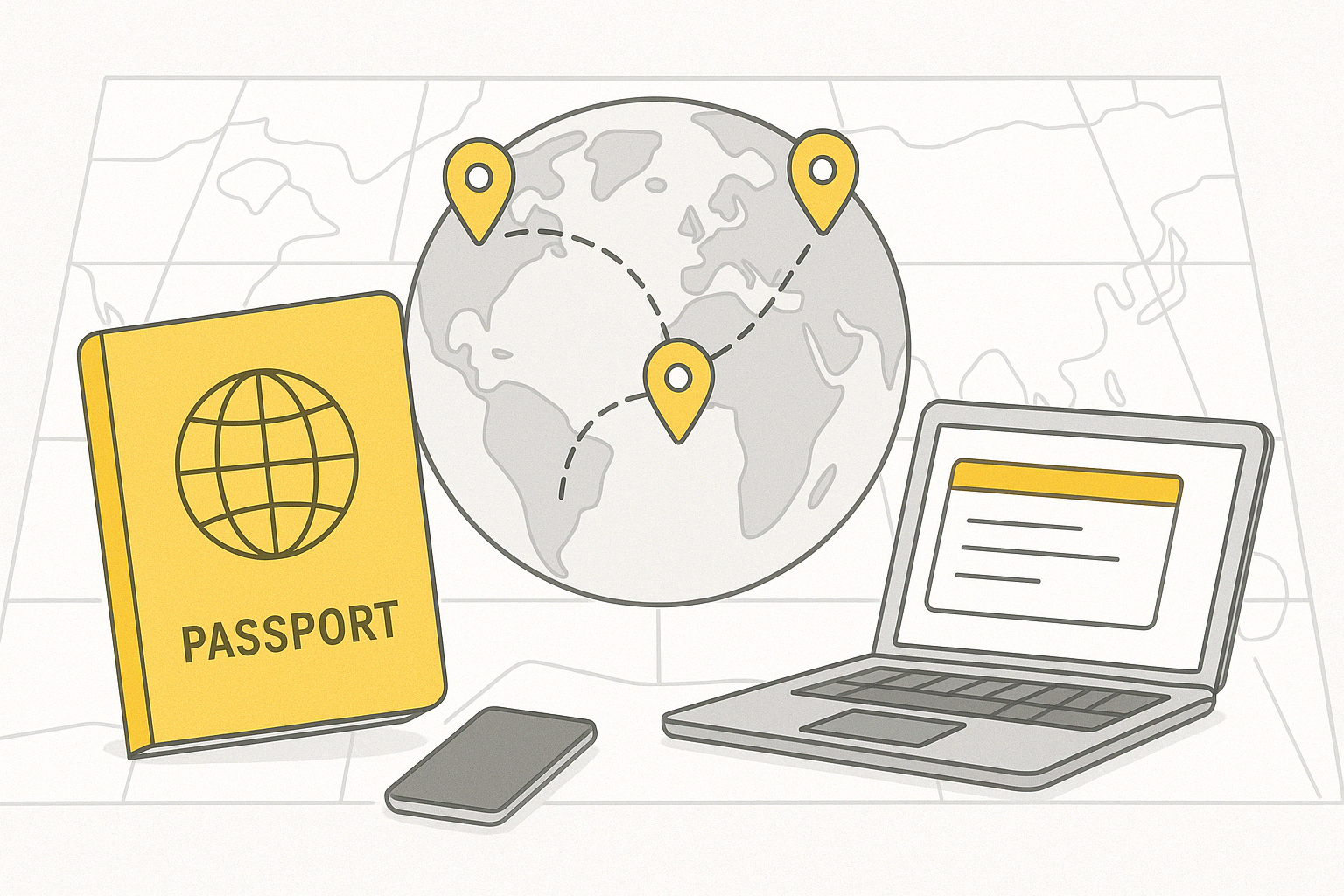Struggling to navigate the maze of work-from-anywhere laws and visa requirements? At [Company], we’ve mapped the 2025 landscape for digital nomad visas in hotspots like Spain, Portugal, and Bali, where remote work meets residency opportunities. Discover how to meet income thresholds, leverage tax incentives, and unlock extended stays in emerging destinations reshaping global remote work.
Table of contents
- Spain Digital Nomad Visa
- Portugal D8 Visa
- Bali Digital Nomad Hub
- Cyprus Nomad Visa
- Croatia Remote Work Permit
- German Remote Work Regulations
- Costa Rica Digital Nomad Program
- Italy Highly Skilled Nomad Visa
- Common Digital Nomad Visa Requirements
- Employer Considerations for Remote Policies
- Digital Nomad Visa Costs
- Low-Income Requirement Destinations
- Passport Validity Rules
- Emerging Nomad Destinations 2025
- Legal Frameworks for Remote Work
- Comparison
Spain Digital Nomad Visa
Spain’s 2025 digital nomad visa requires proof of €2,762 monthly income – nearly double the national minimum wage. This updated financial threshold ensures applicants can sustain themselves while contributing to local economies through Spain’s 24% flat tax rate for foreign-sourced income during the initial four years.
The program offers renewable one-year permits leading to permanent residency after five years, with full Schengen zone mobility. We’ve seen professionals leverage this pathway to establish European bases while maintaining remote contracts, combining Spain’s cultural appeal with long-term career flexibility.
Portugal D8 Visa
Portugal’s D8 visa requires €3,040 monthly income for non-EU applicants, granting renewable two-year residency after initial approval. This financial threshold ensures remote workers can maintain stability while enjoying Portugal’s coastal lifestyle and EU access rights.
Tax advantages include potential 20% flat rates on foreign income for eligible professionals. Families benefit from streamlined applications, though additional funds must be shown for dependents – a practical solution for relocating households seeking European residency pathways.
Bali Digital Nomad Hub
Bali remains a top choice with living costs averaging 40% below Western cities, offering flexible visa options like the E33G Remote Worker Visa for year-long stays. Our team observes professionals balancing tropical lifestyles with reliable coworking infrastructure in Ubud and Canggu’s thriving expat communities.
Applicants must present employment contracts from non-Indonesian companies and international health coverage. Recent updates require proof of $2,000 minimum monthly income, with visa processing typically completed within 15 business days through authorized agents.
Cyprus Nomad Visa
Cyprus offers non-EU professionals a one-year digital nomad visa requiring €3,500 monthly income, renewable for two additional years. This program targets remote workers establishing Mediterranean bases while maintaining employment outside Cyprus, with family members eligible for dependent status.
Foreign income remains tax-exempt during the first 183 days of residence, with potential 50% reductions for high earners afterward. Applicants must submit authenticated employment contracts and health insurance valid across EU territories to qualify.
Croatia Remote Work Permit
Croatia’s digital nomad program requires €2,539 monthly income with online applications processed within 30 days. The permit allows year-long stays for non-EU remote workers and freelancers, exempting foreign income from local taxation.
Holders gain Schengen area mobility while contributing to coastal communities through cultural exchange programs. We’ve helped professionals balance Adriatic coastal living with European business opportunities through this accessible residency option.
German Remote Work Regulations
Germany mandates strict tax compliance for remote workers, requiring income declarations for residents exceeding 183 annual days. Progressive tax rates from 14% to 45% apply, with €6 daily deductions available for home office expenses under current labor laws.
Freelancers obtain residence permits through proof of sustainable income and professional qualifications, while corporate remote workers need employer sponsorship. We guide clients through Germany’s dual system balancing worker protections with complex international employment regulations.
Costa Rica Digital Nomad Program
Costa Rica’s digital nomad visa now permits year-long stays with tax exemptions on foreign income, requiring proof of $3,000 monthly earnings from remote sources outside the country.
The program facilitates local banking access and validates international driver’s licenses for 90 days, removing bureaucratic hurdles for professionals establishing temporary residency in eco-friendly communities.
Italy Highly Skilled Nomad Visa
Italy’s selective program under Article 27 quater requires non-EU professionals to demonstrate six months’ sector-specific experience and €28,000 annual income, targeting tech and engineering specialists through rigorous credential verification.
Applications process through consulates in 45-60 days, granting one-year renewable residency for qualified candidates. We assist high-earners in navigating Italy’s documentation requirements for maintaining dual tax residency status during stays.
Common Digital Nomad Visa Requirements
Nearly half of global destinations now maintain consistent criteria for remote workers. Core documentation needs across programs include:
- Proof of stable income – Minimum thresholds between €2,300-€3,500 monthly through client contracts or employment verification
- Comprehensive health insurance – Coverage including medical evacuation valid for the entire visa duration
- Clean criminal record – Police clearance certificates from all countries resided in during previous five years
- Valid travel document – Passport with six months’ validity and available visa pages
- Remote employment proof – Recent payslips, client agreements, or business registration documents
Supplementary materials typically include bank statements demonstrating financial solvency and accommodation reservations for the initial stay period.
Employer Considerations for Remote Policies
Global remote teams require meticulous tax withholding management across jurisdictions, with social security obligations varying by residency duration. Non-compliance risks include penalties up to 200% of unpaid liabilities in some regions.
We implement encrypted collaboration tools and mandatory cybersecurity training to protect distributed operations. Regular audits ensure adherence to evolving data laws while maintaining productivity across time zones through standardized protocols.
Digital Nomad Visa Costs
Visa fees range from €180 in Portugal to $2,000 in Bermuda, with family packages adding 50-100% to base costs. Entry-level programs like Albania’s remain under €500 total for single applicants.
Hidden expenses include legal assistance averaging €1,200, certified document translations at €30-75 per page, and mandatory health insurance premiums starting at €40 monthly depending on coverage scope and duration.
Low-Income Requirement Destinations
Albania’s digital nomad visa stands out with an €815 monthly threshold, while New Zealand removes income minimums entirely for short-term remote workers. These options enable entry-level professionals and freelancers to establish international bases cost-effectively.
Budget-friendly visas often trade extended durations for accessibility – Albania’s one-year permit contrasts with Portugal’s renewable five-year residency. Our curated list of remote companies helps applicants maximize earnings potential while meeting these financial benchmarks.
Passport Validity Rules
Norway requires passports valid for two years from entry date for digital nomad visa applicants, while most Schengen countries mandate six months’ validity beyond planned stays. These policies prevent mid-visa travel disruptions caused by document expirations.
Passport expiration during residency periods can trigger visa revocation processes, requiring immediate renewal and reapplication. We recommend renewing passports with at least 12 months’ remaining validity before initiating any long-term remote work visa applications.
Emerging Nomad Destinations 2025
South Korea’s new F-1-D visa permits two-year stays for foreign remote workers, while Kenya’s Class N program targets entrepreneurs with $55,000+ annual foreign income requirements. These initiatives aim to attract tech talent through specialized infrastructure and networking opportunities.
Early applicants benefit from reduced competition for housing and co-working spaces, along with inaugural incentives like discounted business registrations. As highlighted in OECD analysis, pioneering nomads help shape sustainable remote work ecosystems in developing destinations while enjoying first-mover advantages.
Legal Frameworks for Remote Work
Global regulatory shifts now address tax residency conflicts and GDPR compliance challenges inherent in distributed teams. Recent EU directives require explicit data processing agreements for cross-border remote workers, while bilateral treaties streamline social security contributions between partner nations.
The US-Portugal Tax Treaty exemplifies effective dual residency management, preventing double taxation for digital nomads. We help clients leverage such agreements through our course for professionals who want to master Linkedin, ensuring compliant personal branding across jurisdictions.
| Country | Monthly Income | Visa Duration | Tax Benefits |
|---|---|---|---|
| Spain | €2,762 | 1 year (renewable up to 5 years) | 24% flat tax up to €600k/year for first 4 years |
| Portugal | €3,480 | 4-month entry visa + 2-year renewable residency | Potential 20% flat rate tax incentive |
| Bali | Not specified | 180 days (B211A) or 1 year (E33G KITAS) | N/A |
| Cyprus | €3,500 | 1 year (renewable for 2 additional years) | Tax-free first 183 days; 50% exemption possible for high earners |
| Croatia | €2,539 | 1-year temporary stay | Tax exemption on foreign income |
Comparison
Selecting the best digital nomad visa requires considering income levels with family needs and professional objectives. Corporate employees often benefit from Spain’s Schengen access and Portugal’s residency pathways, while freelancers prioritize Croatia’s tax exemptions and Costa Rica’s streamlined processes. Explore jobs openings matching each destination’s economic requirements for seamless transitions.
| Country | Monthly Income | Visa Duration | Tax Benefits |
|---|---|---|---|
| Spain | €2,762 | 1 year (renewable up to 5 years) | 24% flat tax up to €600k/year for first 4 years |
| Portugal | €3,040 | 4-month entry + 2-year renewable residency | Potential 20% flat rate tax incentive |
| Bali | Not specified | 1 year (E33G KITAS) | N/A |
| Cyprus | €3,500 | 1 year (renewable for 2 additional years) | Tax-free first 183 days |
| Croatia | €2,539 | 1-year temporary stay | Foreign income tax exemption |
| Costa Rica | $3,000 | 1 year | Tax-free foreign income |
As global remote work becomes the norm, digital nomad visas offer unparalleled freedom with options from Spain’s Schengen access to Costa Rica’s tax incentives. Key requirements like income thresholds and valid documentation ensure smooth transitions, while emerging destinations create new opportunities. Align your remote career with a country that matches your financial goals and lifestyle—the future of work is borderless.
FAQ
What are some unmentioned tax benefits?
Beyond the commonly cited flat tax rates, several other tax advantages can attract remote workers. These include temporary tax exemptions for new residents and attractive tax regimes specifically designed for high-net-worth individuals and skilled professionals. Countries like the UAE offer the significant benefit of no income tax.
Furthermore, leveraging bilateral tax treaties can provide benefits, particularly regarding pension taxation. Careful financial planning, including managing income and deductible professional expenses, can also optimize tax liabilities. Some countries also offer a special tax regime for expatriates.
What insurance pitfalls should remote workers avoid?
Remote workers must ensure their insurance provides adequate geographical coverage for all work locations. The policy should align with their telecommuting status, including health, travel, and home insurance. For international stays, international health insurance is often recommended.
It’s crucial to inform your insurer about your remote work situation, as it affects home insurance, and to verify coverage for employer-provided equipment. Also, ensure you have civil liability coverage and understand unemployment insurance rules for expatriate employees. Always maintain medical coverage for the duration of your stay.
How to choose the best country based on your profile?
Selecting the ideal country involves assessing visa options, accessibility, finances, quality of life, and tax implications. Many countries offer specific visas for remote workers, so verifying the entry conditions is essential. Consider the cost of living, with countries like Thailand and Colombia providing relatively lower expenses.
Taxation is a key factor, so research applicable tax rules, as extended stays can have significant tax implications. Also, prioritize the quality of life and infrastructure, such as reliable internet. Factors like safety, integration, language, and career opportunities should also influence your decision.
What criteria are important for families?
For families considering working remotely abroad, several criteria are vital. The children’s education is paramount, including international schools or homeschooling options. A high quality of life, encompassing safety, cleanliness, and leisure, is essential for raising children.
The cost of living, including housing, food, healthcare, and education, is a determining factor. Access to a quality healthcare system is also a priority. Finally, consider the ease of integration, the availability of suitable housing, and a clear immigration policy.
How to prove your work experience for Italy’s digital nomad visa?
To demonstrate professional experience for Italy’s digital nomad visa, provide documents like tax returns and client invoices if you’re a freelancer. Remote workers can submit pay stubs and employer letters. Generally, you need to prove at least six months of experience as a digital nomad or remote worker.
Other requirements include a minimum annual income of €28,000, health insurance coverage, and accommodation in Italy. The visa, valid for up to a year, can be renewed annually if eligibility conditions are met, targeting highly skilled individuals working remotely for companies outside Italy.
How to find affordable housing as a digital nomad?
To secure affordable housing, consider digital nomad visas offering tax benefits and facilitating access to suitable accommodations. Explore flexible housing solutions with short-term rental options. Renting temporarily allows you to test an area before committing long-term.
Also, consider coliving, a shared living arrangement focused on community and shared workspaces, which can significantly reduce costs. Focus on destinations with a lower cost of living. If you’re an expatriate homeowner, consider specialized agencies to manage your property remotely, generating income.





